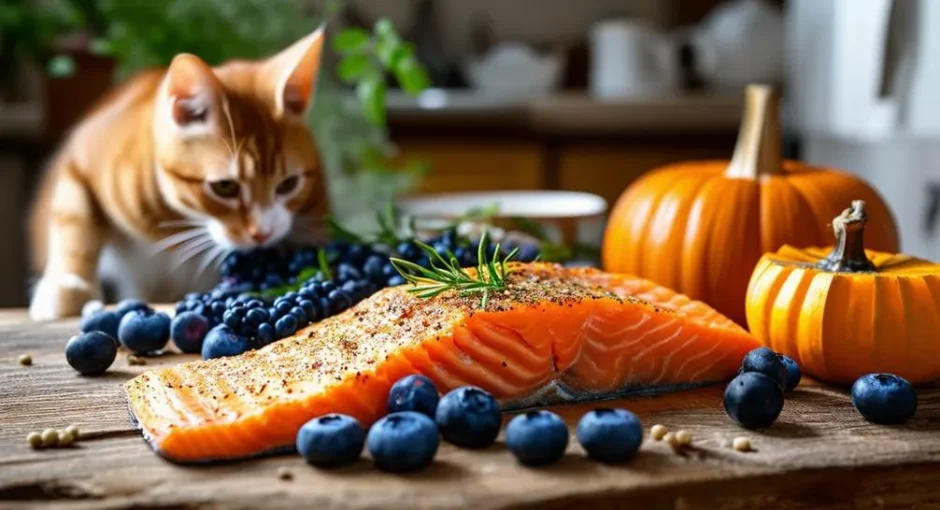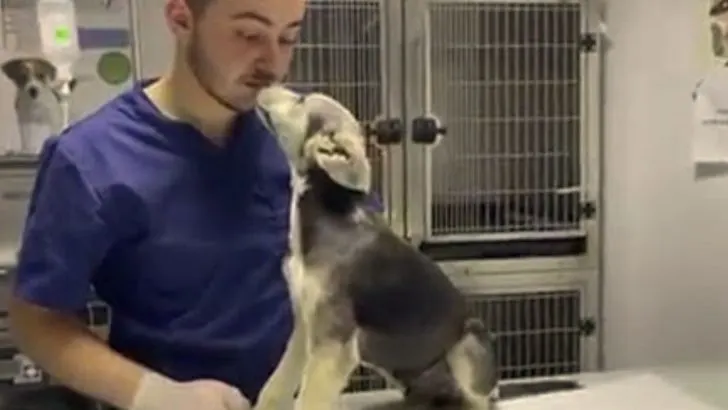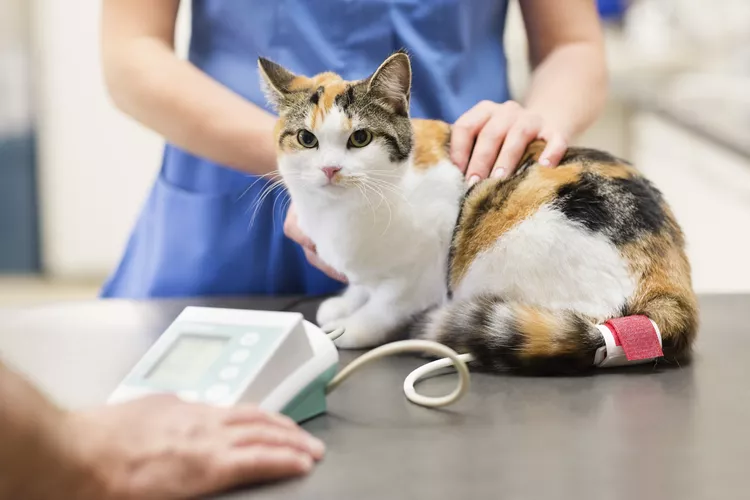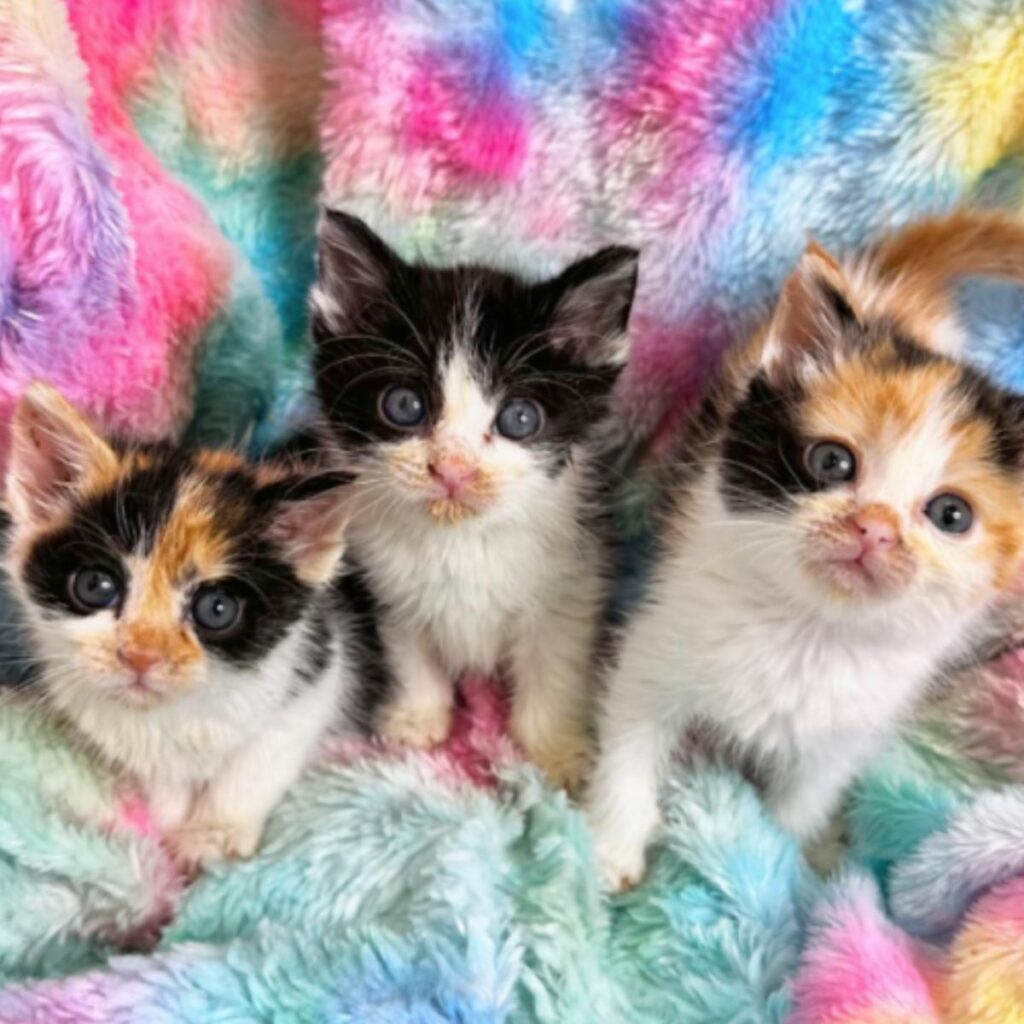When considering the best dietary options for your cat friend, it’s worth exploring human foods that can enhance their health and well-being.
Not only do protein-rich staples like chicken, turkey, beef, fish, and eggs offer essential nutrients important for muscle development and vitality, but there are also surprising benefits found in vegetables and grains.
Foods such as sweet potatoes, carrots, and spinach can provide additional vitamins and minerals that support overall health.
Understanding how these foods contribute to your cat‘s diet can guide you in making more informed choices. So, which of these foods could be a game-changer for your cat‘s nutrition?
Chicken

Including chicken in your cat‘s diet provides a key source of essential nutrients and high-quality protein that supports overall health and well-being.
Chicken is packed with amino acids important for muscle maintenance and repair, promoting lean muscle mass and strength.
Additionally, it contains important vitamins such as B6 and B12, which enhance energy production and support a healthy nervous system.
When preparing chicken for your cat, make sure it is cooked thoroughly, avoiding any seasonings or additives that may be harmful.
Boiled, grilled, or baked chicken is ideal, offering a digestible and nutritious option.
Integrating chicken into your cat‘s diet can lead to improved vitality, a shiny coat, and robust immune function.
Turkey
Turkey offers another excellent source of high-quality protein and essential nutrients for your cat‘s diet.
Rich in vitamins B6 and B12, niacin, and selenium, turkey supports your cat‘s overall health and well-being.
Its lean protein content aids in muscle development and maintenance, ensuring your cat remains active and energetic.
When preparing turkey for your cat, opt for plain, cooked meat, avoiding additives like salt, garlic, or onions, which can be harmful. Serve it boiled, grilled, or baked to retain its nutritional value.
Turkey is not only a delectable treat for your cat but also a nutritious addition to their diet, providing a balanced mix of proteins and essential vitamins to support their growth and vitality.
Beef

Beef is an excellent source of high-quality protein and essential nutrients important for your cat‘s overall health.
Packed with crucial amino acids, iron, zinc, and vitamin B12, beef supports muscle development, boosts the immune system, and enhances energy levels in cats.
When preparing beef for your cat, opt for lean cuts and cook them thoroughly to eliminate any harmful bacteria.
Avoid seasoning the beef, as spices and salt can be detrimental to your cat‘s health.
Serve the beef in small, manageable pieces to prevent choking hazards.
Integrating cooked beef into your cat‘s diet occasionally can provide a nutritious and enjoyable treat, enriching their meal variety and contributing to their well-being.
Fish
Fish is an excellent source of protein and omega-3 fatty acids, essential for maintaining your cat‘s overall health and well-being.
These nutrients contribute greatly to a shiny coat, healthy skin, and peak brain function.
When offering fish to your
Eggs

Following the benefits of incorporating fish, eggs emerge as another nutrient-dense option, loaded with high-quality protein and essential amino acids.
Cats can greatly benefit from the rich nutritional profile of eggs, which support muscle development and overall health.
It is important to serve eggs cooked, as raw eggs pose a risk of salmonella and other pathogens. Scrambled or boiled eggs, without added salt or seasoning, are ideal.
Moderation is key due to the high fat content in eggs. Including eggs in your cat‘s diet occasionally can provide a delightful and nutritious treat, enhancing their overall dietary variety.
As always, consult your veterinarian before making significant changes to your pet’s diet.
Blueberries
Blueberries, a nutrient-packed superfood, offer a wealth of antioxidants, vitamins, and fiber that can be beneficial for your cat‘s health. These tiny berries are rich in vitamins C and K, which support immune function and overall wellness.
The high antioxidant content helps neutralize free radicals, potentially reducing the risk of chronic diseases. Additionally, the fiber in blueberries can aid in digestion, promoting a healthy gut.
Introducing blueberries to your cat‘s diet can be as simple as offering a few fresh or frozen berries as a treat. However, moderation is key; too many blueberries can lead to digestive upset.
Always monitor your cat‘s reaction to new foods to make sure they tolerate them well.
Seaweed

Seaweed, particularly Nori, is a nutrient-dense food that offers essential vitamins and minerals beneficial to a cat‘s diet. Rich in iodine, Nori supports thyroid function, which is important for maintaining your cat‘s metabolic health.
Additionally, seaweed contains antioxidants, vitamin K, and calcium, contributing to overall vitality and well-being. The fiber content in seaweed aids in digestion, promoting a healthy gut.
When introducing seaweed to your cat‘s diet, make sure it is unseasoned and free from additives, as some seasonings may be harmful. Start with small amounts to monitor for any adverse reactions.
Pumpkin
In addition to seaweed, pumpkin is another nutrient-rich food that can greatly benefit your cat‘s health.
Pumpkin is an excellent source of dietary fiber, which can aid in digestion and help alleviate both constipation and diarrhea.
Rich in vitamins A and C, it supports your cat‘s immune system and promotes healthy skin and fur.
To incorporate pumpkin into your cat‘s diet, opt for cooked or mashed pumpkin, ensuring it is plain without added sugars or spices.
This versatile ingredient can be mixed with their regular food or served as a small treat. Moderation is key, as too much pumpkin can lead to digestive upset.
Always consult your veterinarian before introducing new foods to your cat‘s diet.
Sweet Potatoes

Sweet potatoes, rich in beta-carotene and dietary fiber, offer numerous health benefits for cats when fed in moderation.
These vibrant tubers can aid in digestive health and provide essential nutrients that support your cat‘s overall well-being.
However, it is important to prepare them properly: always cook sweet potatoes thoroughly, either by boiling, baking, or steaming, and avoid adding any seasonings or oils.
Mash them into a smooth consistency to make it easier for your cat to eat.
Remember, sweet potatoes should complement your cat‘s diet rather than replace their primary food source.
By incorporating small amounts into their meals, you can provide a nutritious boost that contributes to a balanced and wholesome diet.
Carrots
Cats are an excellent source of vitamin A, promoting both vision and dental health in our furry friends.
These vibrant vegetables can be a delightful and nutritious addition to your cat‘s diet when served appropriately.
Rich in beta-carotene, carrots support eye health, potentially improving your cat‘s night vision and overall ocular function.
Additionally, the crunchy texture of raw or lightly steamed carrots helps in maintaining dental hygiene by naturally scraping away plaque buildup from your cat‘s teeth.
However, it is essential to prepare carrots correctly to maximize their benefits.
Always cut them into small, manageable pieces to prevent choking hazards.
Serving them cooked or steamed is generally preferred, making them easier for your cat to digest and enjoy safely.
Spinach

Spinach, a leafy green vegetable, is packed with essential vitamins A and C, iron, and antioxidants, making it a nutritious addition to your cat‘s diet.
This nutrient-dense vegetable can support your cat‘s overall health by boosting their immune system and providing important minerals.
Including spinach in your cat‘s meals can also aid in maintaining healthy skin and vision.
However, it’s important to serve spinach in moderation and make sure it is cooked to make it easier for your cat to digest.
As with any new food, introduce spinach gradually and observe your cat‘s reaction to ensure they tolerate it well. This simple addition can enhance your cat‘s well-being, offering them a wholesome dietary boost.
Grains
Grains such as rice and quinoa can be beneficial additions to a cat‘s diet, providing essential nutrients and aiding in digestion.
These grains are safe for cat consumption when cooked properly, offering a source of carbohydrates that can complement a protein-rich diet.
Rice, for instance, is gentle on the stomach and can help with digestive issues, while quinoa is packed with essential amino acids and fiber.
Including small amounts of these grains can diversify your cat‘s meal plan, ensuring they receive a balanced array of nutrients.
Always serve grains in moderation, ensuring they are fully cooked to avoid any potential digestive discomfort. By doing so, you can enhance your cat‘s overall health and well-being.
Conclusion
Incorporating protein-rich foods like chicken, turkey, beef, fish, and eggs into a cat‘s diet symbolizes the care and attention given to their overall health. These foods provide essential nutrients, enhancing vitality, coat shine, and immune function.
Vitamins and minerals such as B6, B12, niacin, selenium, iron, and zinc further support energy production and a healthy nervous system. Proper preparation and moderation guarantee a balanced diet, reflecting the dedication to a cat‘s well-being.







